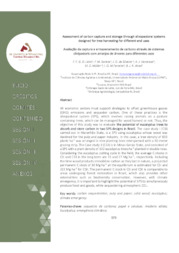Assessment of carbon capture and storage through silvopastoral systems designed for tree harvesting for different end uses.
Assessment of carbon capture and storage through silvopastoral systems designed for tree harvesting for different end uses.
Autoria: MULLER, M. D.; ALVES, B. J. R.
Resumo: All economic sectors must support strategies to offset greenhouse gasses (GHG) emissions and sequester carbon. One of these practices is the silvopastoral system (SPS), which involves raising animals on a pasture containing trees, which can be managed for wood harvest or not. Thus, the objective of this study was to evaluate the potential of eucalyptus trees to absorb and store carbon in two SPS designs in Brazil. The case study I (CSI) carried out in Maranhão State, is a SPS using eucalyptus whose wood was destined for the pulp and paper industry. In this case, a tree density of 833 plants ha-1 was arranged in nine planting lines interspersed with a 30-meter grazing strip. The Case study II (CSII) is in Minas Gerais State, and consisted of a SPS with a plant density of 322 eucalyptus trees ha-1 planted in double rows. Considering the eucalyptus cutting cycle in the field, the average C stocks in CSI and CSII in the long term are 15 and 27 Mg ha-1 respectively. Including the time wood products immobilize carbon as they last in nature, a projected permanent C stock of 30 Mg ha-1 at the equilibrium is estimated for CSI and 222 Mg ha-1for CSII. The permanent C stock in CSI and CSII is comparable to areas undergoing forest restoration in Brazil, which also provides other externalities such as biodiversity conservation. However, with climate emergency, it is important to highlight the potential of SPS to simultaneously produce food and goods, while sequestering atmospheric CO2.
Ano de publicação: 2023
Tipo de publicação: Artigo em anais e proceedings
Unidade: Embrapa Gado de Leite
Palavras-chave: Carbon sequestration, Celulose, Climate emergency, Emergência climática, Eucalipto, Madeira, Madeira sólida, Papel, Paper, Pulp, Sequestro de carbono, Sistema silvipastoril, Wood
Observações
1 - Por padrão são exibidas publicações dos últimos 20 anos. Para encontrar publicações mais antigas, configure o filtro ano de publicação, colocando o ano a partir do qual você deseja encontrar publicações. O filtro está na coluna da esquerda na busca acima.
2 - Para ler algumas publicações da Embrapa (apenas as que estão em formato ePub), é necessário ter, no celular ou computador, um desses softwares gratuitos. Sistemas Android: Google Play Livros; IOS: iBooks; Windows e Linux: software Calibre.
Acesse outras publicações
Acesse a Base de Dados da Pesquisa Agropecuária (BDPA) para consultar o acervo completo das bibliotecas da Embrapa.

